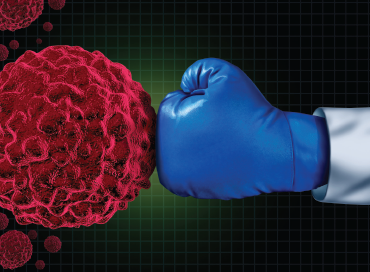
Lightspring / shutterstock.com
Since they were first introduced in 2011, immune checkpoint inhibitors (ICIs) have become an important treatment for an expanding list of advanced cancers. Some concerns have been raised around the mechanism of action of these immunotherapy agents, making their use in rheumatic diseases (RD) problematical. An article in the March 2018 issue of Arthritis & Rheumatology takes an initial look at the risk of flare or other adverse effects in this population.1
“ICIs work differently from chemotherapies that may deplete not only cancer cells, but also healthy ones,” says Uma Thanarajasingam, MD, PhD, an assistant professor of medicine within the Division of Rheumatology at the Mayo Clinic in Rochester, Minn. “ICIs target specific molecules that essentially act as brakes for the immune system, allowing the body to more efficiently attack the cancer cells.”
ICI Mechanism of Action Implicated in Autoimmune Disease
The problem arises because ICIs work in a nonspecific way. They inhibit the actions of CTLA-4, PD-1 and its ligands, which have been implicated in autoimmune diseases. Because of this, and the possibility of triggering flares or new disease activity in patients, people with RD were largely excluded from clinical trials. What happens when rheumatology patients receive ICIs remains unknown, thus physicians are hesitant to offer this effective immunotherapy to those with rheumatic diseases.
“I realized that a lot of our patients with RD at baseline were not included in the trials leading up to approval,” says Dr. Thanarajasingam. “Our patients also develop cancers, and we, of course, want them to be able to access potentially life-saving medications when possible.”
Study Enters 16 Patients
Dr. Thanarajasingam and colleagues performed a retrospective study to identify all patients at the Mayo Clinic who had received ICI therapy between 2011 and 2016. They identified about 700 people and using specific diagnostic codes, those with preexisting rheumatic disease were identified.

Dr. Thanarajasingam
Sixteen patients were entered into the review. Of these, 81% were female, with an average age of 68.3 years. The most common diseases were rheumatoid arthritis and polymyalgia rheumatica (five people each) followed by systemic lupus erythematosus and Sjögren’s syndrome (two people each).
Ten patients had previously been treated with a disease-modifying anti-rheumatic drug (DMARD) and two were still taking them at the time ICIs were initiated. Three more patients had already been prescribed glucocorticoids when the cancer treatment was started.



